This category is for online RPAS training courses
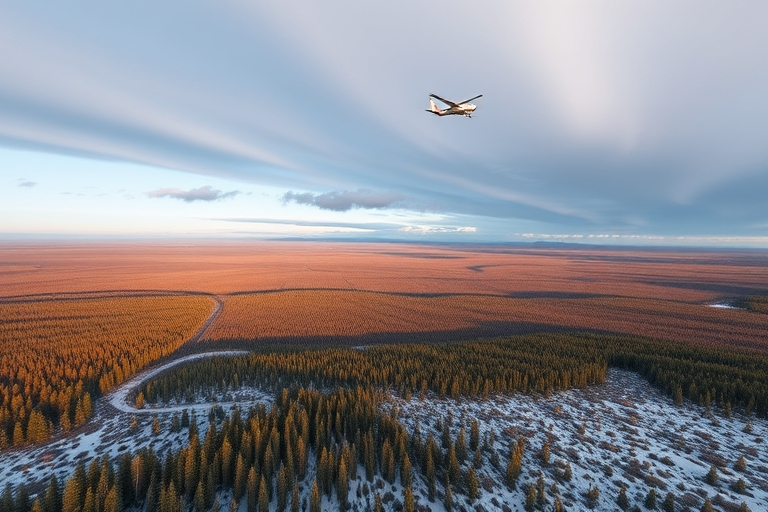
$2,399 CDN per participant
Toronto Sept 22, Sudbury Sept 29, Ottawa Oct 6,
Vancouver Oct 20, Calgary Nov 10, Montreal Nov 24
Dates and locations are subject to change based on availability or unexpected circumstances Course Description
This 40-hour, 5-day in-class course equips Advanced RPAS pilots with the skills to plan and execute Beyond Visual Line of Sight (BVLOS) missions compliant with Transport Canada’s Level 1 Complex Operations (TP 15530E, effective November 4, 2025). Using the JARUS Specific Operations Risk Assessment (SORA) framework, students master regulatory compliance, risk assessment, and mission planning through real-world scenarios: Arctic border patrol, flood response, pipeline inspection, disaster response, and international infrastructure inspection. The course integrates Canadian regulations (CARs Part IX) with global best practices, ensuring applicability for diverse operational contexts.
Target Audience
· Law Enforcement: SWAT, Special Investigations, Federal Agencies
· Military: ISR Units, Special Operations Forces
· Government: Security and Intelligence Agencies
· Drone Operators: Tactical Analysts, Mission Planners
· Decision-Makers: Defense, Homeland Security, Counterterrorism
Participants must hold a Transport Canada Advanced Pilot Certificate and be familiar with VLOS operations and CARs Part IX.
Learning Outcomes
By the end of the course, students will:
· Independently complete a SORA for Level 1 BVLOS operations, addressing Ground Risk Class (GRC), Air Risk Class (ARC), and Operational Safety Objectives (OSOs).
· Demonstrate mastery of CARs Part IX and TP 15530E requirements across 10 knowledge areas: air law, systems, navigation, airspace, human factors, meteorology, theory of flight, radiotelephony, flight operations, and risk assessment.
· Answer all TP 15530E questions with confidence.
· Apply risk mitigation strategies in Canadian-specific (e.g., Arctic border patrol, pipeline inspection) and global scenarios.
· Develop operational procedures, contingency plans, and safety protocols for BVLOS missions.
Course Structure
· Duration: 5 days, 8 hours/day (40 hours total)
· Daily Schedule:
o Morning Session: 9:00 AM – 12:00 PM (15-minute break at 10:30 AM)
o Lunch: 12:00 PM – 1:00 PM
o Afternoon Session: 1:00 PM – 5:00 PM (15-minute break at 3:00 PM)
· Delivery: Lectures (6–7 hours/day), interactive activities (1 hour/day: case studies, role-playing, group analyses), daily quizzes (5 questions), and practical exercises.
· Materials: Comprehensive student workbook (notes, worksheets, 10-question quizzes), instructor-led slides (20–25/day), tactical diagrams, flowcharts, scenario templates.
Daily Topics
Day 1: Foundations of BVLOS Operations
· CARs Part IX regulations, definitions, RPAS Operator Certificate (RPOC).
· JARUS SORA framework: operational parameters, risk assessment overview.
· Scenario: Arctic border patrol (counter-smuggling).
Day 2: SORA Ground Risk Assessment
· Ground Risk Class (GRC) determination: population density, site surveys.
· Regulatory compliance for ground risk mitigation, environmental factors.
· Scenario: Flood response in rural Canada.
Day 3: SORA Air Risk Assessment
· Air Risk Class (ARC) evaluation: airspace density, detect-and-avoid systems.
· Airspace coordination, radiotelephony protocols.
· Scenario: Pipeline inspection in Western Canada.
Day 4: Operational Safety Objectives and Mitigation
· Operational Safety Objectives (OSOs) for SAIL I/II, contingency procedures.
· Human factors, emergency response planning.
· Scenario: Disaster response in urban Canada.
Day 5: Comprehensive Mission Planning and Assessment
· Full SORA development and documentation.
· Integration of regulations, SORA, and scenarios.
· Scenario: International infrastructure inspection.
· Final exam and practical mission planning exercise.
Assessment Methods
· Daily Quizzes: 5 multiple-choice questions/day, covering regulations, SORA, and scenarios.
· Daily Practical Exercises: Mission planning tasks with rubrics focused on compliance and decision-making.
· Group Scenario Analyses: Collaborative exercises simulating real-world BVLOS missions.
· Final Exam: 20-question multiple-choice exam (7 regulations, 7 SORA, 6 scenarios).
Why Choose This Course?
· Practical Focus: Scenarios tailored to Canadian (e.g., Arctic, pipeline inspection) and global contexts.
· Expert Instruction: Led by ISR specialists with extensive BVLOS expertise.
· Comprehensive Materials: Student workbook, detailed slides, and hands-on tools.
· Regulatory Compliance: Aligned with Transport Canada’s 2025 BVLOS regulations and TP 15530E.
- Teacher: Darren Clarke

This 16-hour in-class course, delivered over two days, equips students with the expertise to apply Operational Safety Objectives (OSOs) within the Specific Operations Risk Assessment (SORA) framework for Level 1 Beyond Visual Line of Sight (BVLOS) operations, with a focus on Transport Canada regulations. Designed for pilots holding Basic or Advanced Pilot Certificates, the course assumes familiarity with Visual Line of Sight (VLOS) operations and Canadian Aviation Regulations (CARs Part IX). Through a balanced mix of regulatory instruction, SORA processes, and real-world scenario analyses, students will develop the skills to independently create a SORA, ensure regulatory compliance.
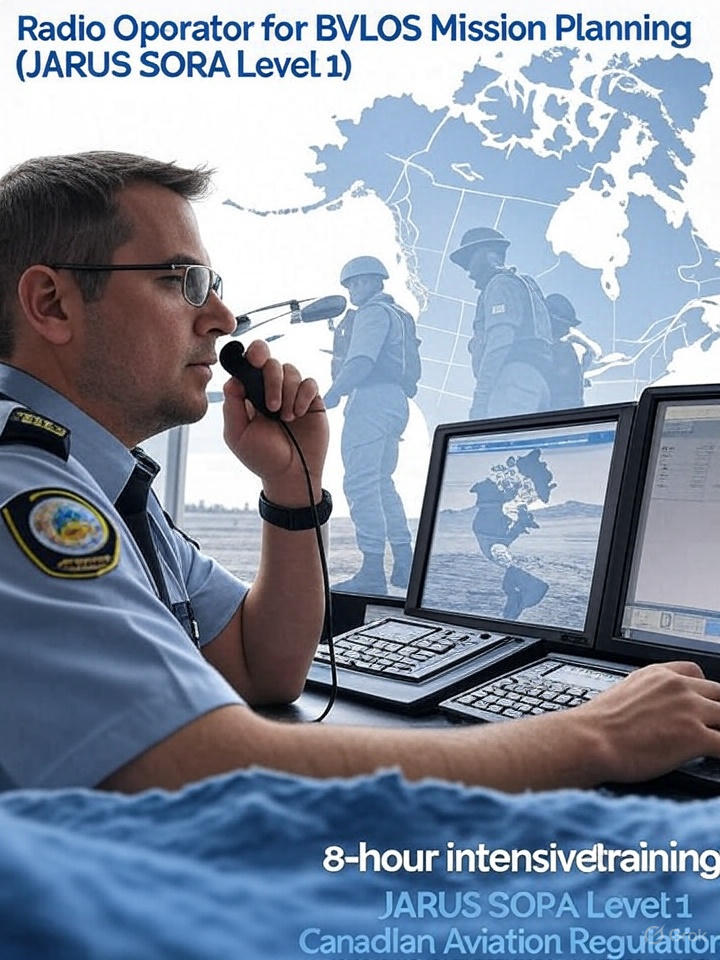
This intensive 8-hour course equips participants with the essential skills and knowledge to operate radio systems effectively and conduct JARUS SORA Level 1 assessments for Beyond Visual Line of Sight (BVLOS) operations, in compliance with Canadian Aviation Regulations (CARs) Part IX and TP 15530E. Designed for aspiring radio operators, the course covers critical topics including radio communication protocols, SORA framework, Canadian regulatory requirements, and scenario-based mission planning for applications such as border patrol, disaster response, and infrastructure inspection.
The course is structured into four modules, blending lectures, interactive activities, and assessments to ensure practical understanding. Participants will master RIC-21 protocols, ICAO phonetic alphabet, and 20 key radio phrases, while engaging in role-playing exercises and group discussions to reinforce communication skills. The SORA Level 1 framework is explored through case studies and flowchart exercises, focusing on risk assessment and mitigation strategies. Regulatory compliance is emphasized with scenario analyses, and mission planning is honed through tactical exercises tailored to real-world BVLOS scenarios. Each module includes a 10-question quiz and a practical exercise, culminating in a 15-question final exam covering regulations, SORA, and operational scenarios.
Materials provided include a comprehensive student workbook with notes, worksheets, quizzes, and reference materials, supported by instructor resources and 25 professionally designed PowerPoint slides. By the end of the course, participants will be prepared to confidently execute BVLOS radio operations, complete SORA assessments, and ensure regulatory compliance.
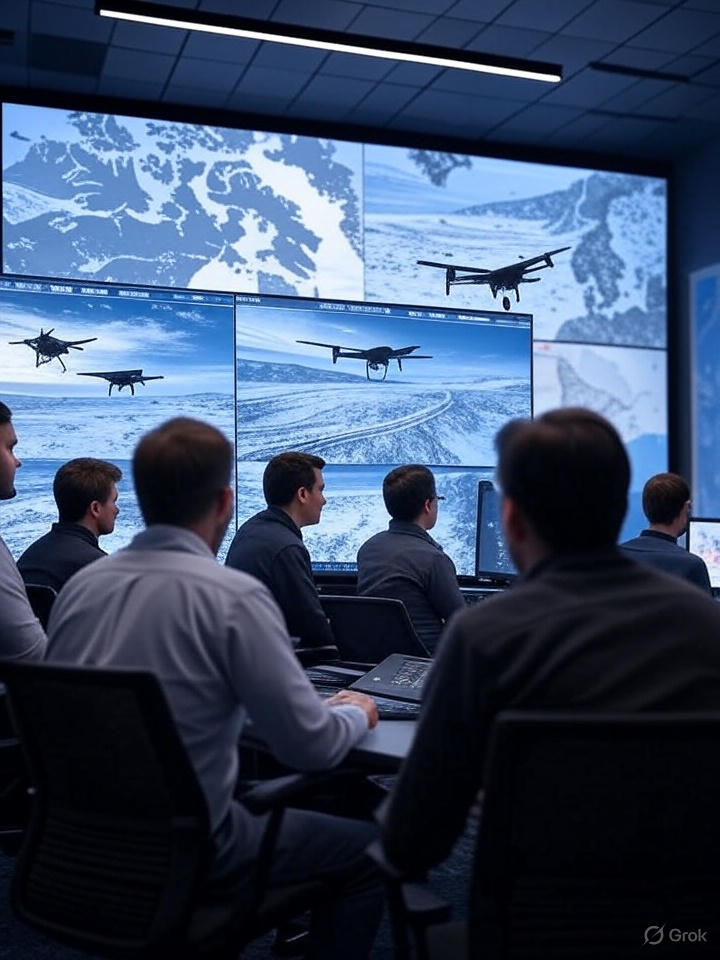
This intensive 8-hour in-class course equips participants with the knowledge and skills to serve as Visual Observers in Beyond Visual Line of Sight (BVLOS) operations, compliant with Transport Canada’s regulations and the JARUS Specific Operations Risk Assessment (SORA) Level 1 framework. Designed for individuals holding a Transport Canada Advanced Certificate, the course builds on existing knowledge of Visual Line of Sight (VLOS) operations and Canadian Aviation Regulations (CARs Part IX). Participants will master BVLOS mission planning, regulatory compliance, and risk assessment through a blend of lectures, interactive activities, and real-world scenarios. The course emphasizes Canadian contexts (e.g., northern borders, Arctic operations) while incorporating global applicability for international applicability.

Course Fee $249.00 The Advanced course is for flying : In Controlled and Uncontrolled Airspace, Closer than 30m to People, Can fly Overhead of People with Certain Restrictions
Not Certain which course is for you, try this free tool by the National Research Council. Zoom in to where you want to fly and review the map.
https://nrc.canada.ca/en/drone-tool/
Clarion's Level 2 Advanced Knowledge Requirements TC EXAM PREPCourse is designed to help prepare student pilots with the practical and essential theory needed to write the online Transport Canada RPAS exam for Advanced categories.
The Training is in compliance with Transport Canada’s TP 15263E – Knowledge Requirements for Pilots of Remotely Piloted Aircraft Systems, 250 g up to and including 25 kg. Operating within Visual Line-of-Sight (VLOS)
Foreign Nationals WILL REQUIRE this Advanced Knowledge Course and NOT the BASIC for the complete TP 15263E requirements needed by Transport Canada
Unfortunately, at this time, these exams can only be taken by Canadians. While the process for foreign pilots is a little more complicated, it is still possible to get permission to fly if you follow the right steps.
The course objective is to provide the knowledge required to help RPAS students write the online Advanced Transport Canada exam.
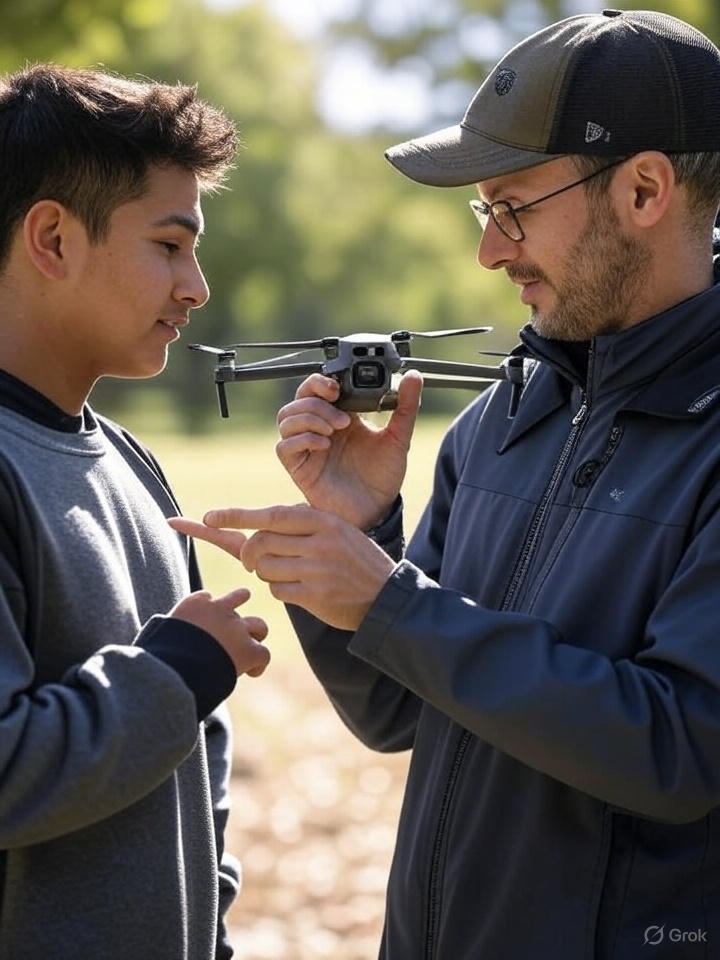
Flight Review Information for RPAS (Canada)
Overview
Flight reviews for Remotely Piloted Aircraft Systems (RPAS) are conducted at various locations across Canada. Contact us to find a location near you or check the Training Events Tab for upcoming reviews. The fee is $250, and reviews are weather-dependent.
Scope of the Flight Review
The flight review assesses the planning, preparation, and execution of an RPAS flight. Candidates must apply relevant performance data and approved operating procedures, though aircraft performance and weight-and-balance are not tested separately.
Prerequisites
- Age: Candidates must be at least 16 years old.
- Exam: Successful completion of the Small Remotely Piloted Aircraft (VLOS) – Advanced Operations exam (Transport Canada).
- Identification: Provide valid government-issued ID with name and date of birth (e.g., passport, driver’s license, citizenship certificate, permanent resident card, or military ID).
- Reference Numbers: Submit the unique reference number from your Drone Management Portal account and the exam pass reference number to the Flight Reviewer for verification.
- RPAS Condition: The RPAS must be airworthy, with all required documents valid per Canadian Aviation Regulations.
- Weather: Reviews are conducted only when weather conditions are safe. The candidate decides whether to proceed.
Failure of the Flight Review
Failure of any single item results in failing the entire review. A complete redo is required if:
- Any item is failed.
- An inadequate site survey is conducted.
- Poor visual scanning techniques are demonstrated.
- Unsafe flying or dangerous behavior is displayed.
- Lack of training or competency is evident.
Assessment Areas
Airmanship
- Perform accurate, continuous checks.
- Conduct a proper site survey.
- Look out for other aircraft and select appropriate takeoff areas.
- Demonstrate consideration for other aircraft.
Problem Solving and Decision Making
- Anticipate issues to avoid crises.
- Use an effective decision-making process.
- Prioritize tasks and utilize available resources.
- Consider long-term consequences of decisions.
Situational Awareness
- Monitor weather, aircraft systems, and communications.
- Avoid tunnel vision and stay alert to environmental changes.
- Prepare for expected or contingency situations.
Communication
- Provide clear briefings and decisions.
- Request information or advice when needed.
- Clearly communicate location if required.
Workload Management
- Organize resources effectively.
- Recognize and eliminate distractions during high workload.
- Adapt to changing conditions.
Skills Checklist
- Describe the site survey process.
- Outline emergency procedures (e.g., lost-link, fly-away, incident reporting to Transport Canada).
- Perform pre-flight checks, takeoff, navigation around obstacles, distance recognition, and landing.
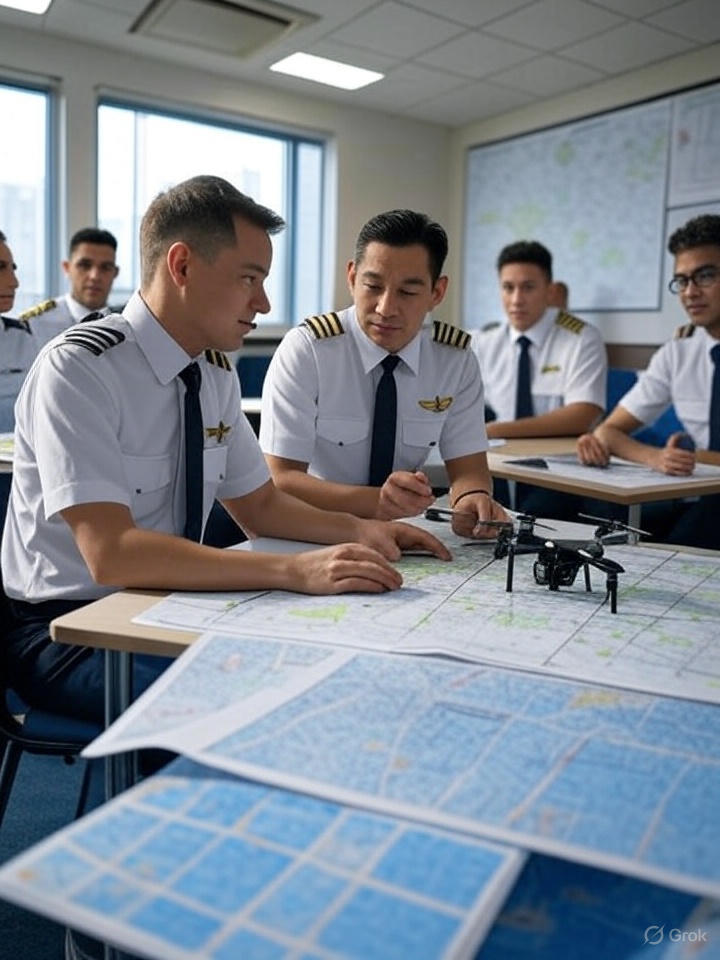
Advanced DoD RPAS Pilot Training
Course Description
Overview
This four-day, classroom-based course, developed in collaboration with the Department of Defense, is designed to provide comprehensive training for existing pilots and aspiring student pilots seeking to operate in advanced Remotely Piloted Aircraft System (RPAS) environments. The program equips participants with the knowledge, skills, and certifications necessary to excel in professional RPAS operations.
Course Objectives
- Prepare students for advanced RPAS operations through theoretical instruction and practical exercises.
- Facilitate the acquisition of the Restricted Operator Certificate – Aeronautical (ROC-A) through an in-class examination.
- Provide in-depth training on mission planning, situational awareness, and Special Flight Operating Certificates (SFOCs).
- Offer hands-on RPAS flight experience with a focus on mission-specific applications.
Certification
Participants will undertake the in-class RPAS examination for the Restricted Operator Certificate – Aeronautical (ROC-A), which authorizes the use of aviation radio. Upon successful completion, instructors will submit test results to Innovation, Science and Economic Development Canada (ISED). ISED will, at its discretion, issue the ROC-A radio license to successful candidates via mail.
Curriculum Highlights
Mission Planning and Situational Awareness
The course includes detailed instruction on mission planning, emphasizing map reading, situational awareness, and operational preparedness. A dedicated module on Special Flight Operating Certificates (SFOCs) will clarify their application, including when they are required based on mission-specific parameters. This ensures students understand the regulatory requirements for both civilian and professional RPAS operations.
Collaborative Learning
Students will be organized into small teams to foster active participation and collaboration. Each team will engage in practical mission planning exercises, ensuring all participants gain hands-on experience in developing and executing operational strategies.
Practical RPAS Flight Training
The course incorporates hands-on RPAS flight training, with a focus on mission-specific techniques and operational details. This practical component allows students to apply theoretical knowledge in real-world scenarios, enhancing their ability to operate RPAS effectively in advanced environments.
Course Duration
The program spans four (4) days of intensive in-class instruction, combining lectures, discussions, team-based exercises, and practical flight training.
Target Audience
This course is tailored for:
- Current pilots seeking to expand their expertise into advanced RPAS operations.
- Student pilots aspiring to work in professional or advanced RPAS environments.
Conclusion
This comprehensive training program equips participants with the technical, regulatory, and practical skills required for advanced RPAS operations. By combining classroom instruction, collaborative exercises, and hands-on flight experience, the course ensures students are well-prepared to meet the demands of professional RPAS environments and achieve their ROC-A certification.

Course Fee $599 This ONE (1) Day (in classroom ) course is directly aimed at Student Pilots wanting to pass a Flight Review for Advanced RPAS operations.
Check the Training Events page for classes near you, dont see one, send us a message and lets get a class scheduled near you today !
Students are encouraged to have their online Transport Canada Advanced exam completed before arriving in class.
Students will also be given their IN CLASS RPAS (drone) exam for the (ROC-A) Restricted Operator Certificate for use of aviation radio. Once successfully passed, the instructors will send your test results to ISED - Innovation, Science and Economic Development Canada and they will at their own discretion send the student a radio licence via mail.
The one (1) Day class also features a discussion on Special Flight Operating Certificates (SFOC) and Mission Planning which will involve map reading and situational awareness.
Most of the day is spent on Mission Planning with Classification of Airspace determination and how to conduct your flights legally and safely for Advanced permit pilots.
Students are broken into small teams so that ALL students are involved and practice with the Mission Planning.
Course does NOT include any hands-on RPAS flying.